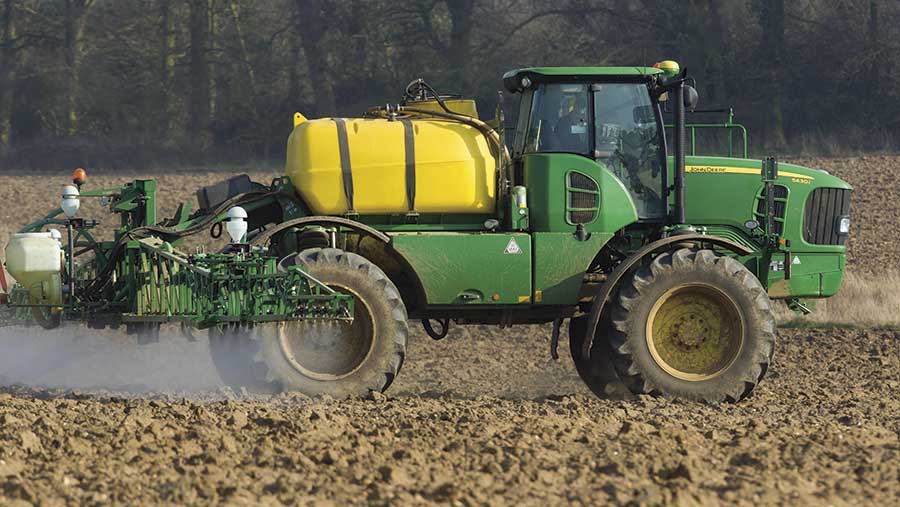Farmers launch Twitter campaign to keep ‘vital’ glyphosate
 © Tim Scrivener
© Tim Scrivener Farmers have taken to social media urging support to keep glyphosate. They warn its loss would increase production costs, decrease yields and lead to environmental damage.
The Twitter campaign under the hashtag #glyphosateisvital has been backed by a number of British farmers, who have posted tweets in support of keeping the herbicide.
Glyphosate, the central ingredient in Monsanto’s herbicide Round-up, is a vital tool for weed control which allows farmers to use conservation tillage techniques such as minimum or zero tillage.
See also: Three growers look for three alternatives to popular herbicide
When used as a min-till establishment technique, it allows growers to reduce ploughing and decrease subsequent greenhouse gas emissions by leaving the soil undisturbed.
The NFU says glyphosate is “fundamental for weed control at pre-planting or pre-emergence stages on stubble fields”.
In June 2016, the European Commission extended the license to market glyphosate for another 18 months following conflicting scientific advice on its possible carcinogenicity.
Licence review
The licence will be up for review at the end of 2017 and the European Chemicals Agency has started its review into glyphosate. It has been tasked with deciding if it should be classed as a carcinogen.
The latest Twitter campaign by farmers lobbying to keep glyphosate follows several campaigns by green groups and NGOs, including Friends of the Earth and the Soil Association, calling for an outright ban of the herbicide.
NFU vice-president Guy Smith said: “As we start the lobbying run into the relicensing of glyphosate at the end of 2017, it’s not surprising to see new activity trying to demonise this key crop-protection material.
“It’s interesting the scientists behind the latest scare stories are the same ones who have tried to prove GM food causes health problems.
“The NFU are now redoubling efforts in Brussels to make sure sound science dictates the regulation here and that regulators are aware of the importance of glyphosate when it comes to keeping EU and UK farmers competitive and how it can help farmers reduce their carbon footprint when it comes to reducing cultivations and drying crops.”
According to Adas, the value of the use of glyphosate in the arable sector is €633m (£547m) a year. It has estimated its loss would see UK production of winter wheat and winter barley drop by 12% and oilseed rape by 10%.
‘Crucial tool’
The loss of glyphosate would require 49% more man hours a year for crop establishment, says Adas.
Mark Buckingham, UK spokesman for Monsanto, said: “Glyphosate is one of the most thoroughly tested herbicides on the market, those tests by expert regulators have consistently concluded that glyphosate can be safely used.
“Glyphosate is a crucial tool in a farmers’ armoury. When used according to the label, it is less toxic than baking soda, table salt and the caffeine in our coffee and it enables farmers to control weeds while protecting soil life such as earthworms and reducing carbon emissions.”
We all benefit from #Glyphosate it reduces CO2 emissions on farm by 12m tonnes = to emissions from an extra 2.5m cars pic.twitter.com/FBR9mbM26b
— Longwool (@Longwool) January 19, 2017
According to IARC #glyphosate is as safe as red meat, safer than bacon. So nothing to fear & essential for farming & healthy food production pic.twitter.com/MIvBcolcfW
— Andrew Ward 🇬🇧🚜 (@wheat_daddy) January 22, 2017
